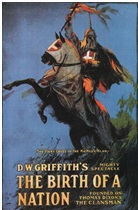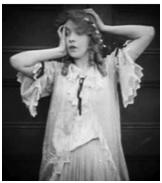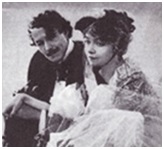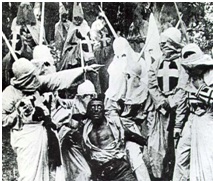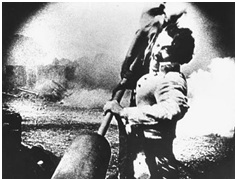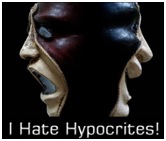|
 |
|
 |
|
|
||
The Birth of a Nation - Racism, Ethics and Leadership
The Birth of a Nation (1915)
Famous for...
Set during and after... The American Civil War in which the North (the Union side) led by the president, Abraham Lincoln (pictured right), fought the South (the Confederates) over the abolition of slavery. Based on... Thomas Dixon’s (pictured right) novel, The Clansman.
Director D.W. Griffith (pictured right).
Oscars None (the Oscars started in 1929). Key characters Elsie Stoneman (Lilian Gish, then a movie superstar), a beautiful young lady from Washington in the North (pictured right). Ben Cameron (Henry Walthal), colonel in the Confederate army from Piedmont, South Carolina, and founder of the Ku Klux Klan.
The story The Stonemans, a Northern family, become friendly with the Camerons from South Carolina in the South, where African Americans are slaves. Ben Cameron falls for Elsie Stoneman (the daughter of the
abolitionist leader, Austin Stoneman) just before the outbreak of the American Civil
War. (Ben and Elsie are pictured right together). Ben, with his brothers, Wade and Duke, join the Confederate army and Elsie’s brothers, Phil (in love with Ben's sister, Margaret) and Tod, join the Unionists on the North’s side. Duke and Tod die in each other’s arms on the battlefield and Wade is killed in Atlanta. The film shows the Unionist army as the villains, destroying Georgia and ransacking the Camerons’ house. Ben and Phil meet in battle. Ben is heroic (saving an enemy soldier) and taken to a Unionist hospital, where he meets Elsie, a nurse. On hearing a personal appeal from Elsie’s mother, President Lincoln pardons Ben of a false charge of spying and so saves him from execution. After the war, Ben returns to his destroyed home and greatly mourns Lincoln’s assassination. But he hates Lincoln's pro-black replacement, Austin Stoneman. His half-black deputy, Silas Lynch, is attracted to Elsie and organizes a vengeful rebellion of former slaves against the whites. The Cameron and Stoneman families are now drifting apart because of the war’s bitter memories. Looting by blacks and their state election victory prompt Ben to form the Ku Klux Klan to fight the “black supremacy” of the African American government, led by Lynch. Blacks are thrilled with their new equal rights. Elsie is so upset by Ben's racism that she ends their engagement. He leads thousands of the Klan against
Lynch’s men. A black officer and ex-slave, Gus, chases Ben’s sister, Flora, who refuses to marry or even touch him (despite his assurances that he won’t harm her). Gus chases her to a cliff edge and Flora falls off, dying shortly after in Ben’s arms. The Klan capture Gus (pictured right), lynch him and dump his body at Lynch’s door. Lynch’s men (including whites) seek revenge against the Klan, and Ben’s father, his sister (Margaret) and Elsie’s brother (Phil) flee to a country cabin. Elsie asks Lynch to help them, but he tries to force her to marry him, promising to make her queen of his “Black Empire”. Her hypocritical father is appalled by the idea, even though he is lusting after his black housekeeper, Lydia. The Klan rescue Elsie from Lynch and everyone at the cabin. At the next election blacks are disenfranchized (through intimidation by the Klan) and a white government exploits and enslaves them Elsie marries Ben, despite her misgivings about the Klan. Phil also marries Margaret.
Lessons for racism, ethics and leadership 1. Racism is wrong The film’s racism shows that the civil war didn’t give African Americans:
The Ku Klux Klan kills Gus, whose only crime is to love a white woman.
2. The power of propaganda The false portrayal of the blacks and abolitionists shows how the cinema can be used to mislead people. The heroes are the Ku Klux Klan (pictured right in 1922) but they are evil racists.
3. War is wicked The Civil War:
Elsie’s purity and beauty contrast with the horrors of war.
4. Life is full of painful choices Elsie chooses Ben, even though she hates his racism and the Ku Klux Klan.
5. Hypocrisy is horrible Elsie’s father is appalled by her possible marriage to Lynch, but this doesn’t stop him lusting after his black housemaid, Lydia.
6. We need great leaders
Key quote on war War, the breeder of hate (film caption).
Two film websites to recommend 1. filmsite.org (run by Tim Dirks). 2. aveleyman.com (run by Tony Sullivan)
|
|
|
||
|
|
||
| Copyright © wisdomtowin.com 2025 All Rights Reserved | ||
|


